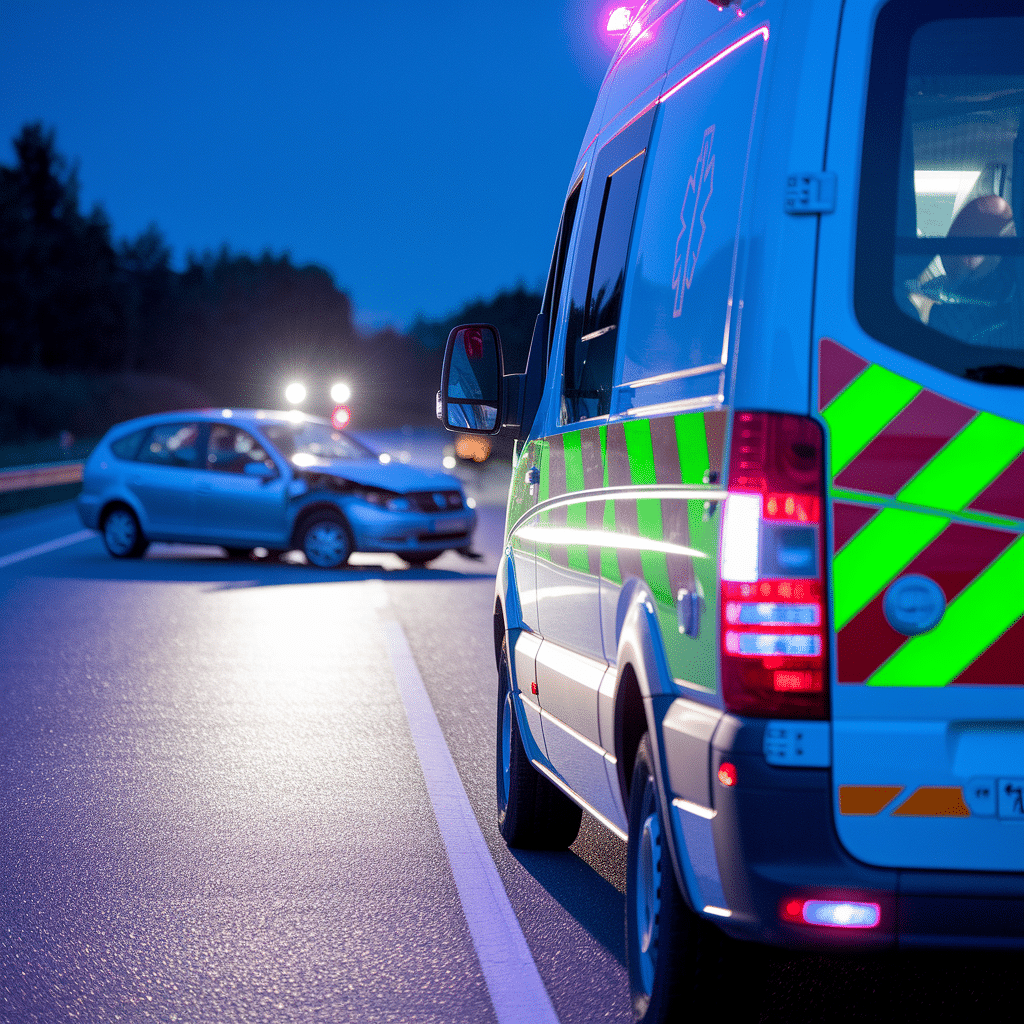Every day across the United States, thousands of traffic accidents occur that change lives forever. The scale of this national issue is staggering. Motor vehicle crashes cost American society billions annually, with recent years seeing over 40,000 fatalities and millions of injuries nationwide. These crashes result in substantial economic costs, including property damage, medical expenses, and lost productivity. Behind these statistics are real people facing pain, medical bills, and uncertainty about the future.
If you’ve recently been injured in an auto accident, you’re likely dealing with physical pain alongside confusion about medical care, insurance claims, and your legal options. At Podor Law, our team brings over 40 years of combined experience helping auto injury victims navigate these challenging waters.
This guide will walk you through what you need to know about auto injuries—from recognizing common injury types and symptoms to understanding your legal rights. We’ve designed this information to give you clear, practical guidance during this difficult time.
Common Types of Motor Vehicle Injuries
Motor vehicle collisions can cause a wide range of injuries, varying from mild to life-threatening. Understanding these injuries can help you recognize potential problems and seek appropriate treatment.
Whiplash and Soft Tissue Injuries
Whiplash is one of the most common auto injuries, especially in rear-end collisions. It occurs when your head jerks rapidly backward and then forward, straining the soft tissues in your neck and upper back. Whiplash affects the cervical muscles, ligaments, discs, and nerve roots, causing inflammation and microscopic tearing. A key part of whiplash injury is that symptoms often don’t appear immediately—it may take 24 hours or more for pain and stiffness to develop.
Other soft tissue injuries include sprains (overstretched or torn ligaments) and strains (damaged muscle or tendon fibers) throughout the body. These injuries can be painful and limiting but often don’t show up on standard X-rays.
Traumatic Brain Injuries (TBI)
Brain injuries range from mild concussions to severe trauma and occur when the head strikes an object or experiences violent movement. A concussion is a mild TBI that temporarily affects brain function, while more severe forms may cause bruising, torn tissues, bleeding, and physical damage to the brain. Motor vehicle crashes are among the leading causes of TBI in the United States. These injuries can have profound short and long-term effects on cognitive function, memory, mood, and physical abilities.
Spinal Cord and Back Injuries
The force of a collision can damage the vertebrae, discs, or the spinal cord itself. Common crash-related back injuries include herniated discs (where the cushioning disc between vertebrae ruptures or bulges) and vertebral fractures. In severe cases, spinal cord injuries may cause partial or complete paralysis by interrupting nerve signal transmission. Back injuries often cause chronic pain and may require extensive treatment, from physical therapy to surgery.
Fractures and Broken Bones
High-impact collisions frequently result in broken bones. A fracture is a break in the continuity of bone that occurs when force exceeds the bone’s ability to withstand it. Injuries below the knee are common in frontal crashes as the feet and legs absorb impact forces. Arms, ribs, and collarbones are also frequently injured in auto accidents. Compound fractures, where bone breaks through skin, are particularly serious and require immediate medical attention.
Internal Injuries and Organ Damage
Blunt force trauma during a crash can cause internal bleeding or damage to organs like the liver, spleen, lungs, or kidneys. Internal injuries may include contusions (bruising), lacerations (tears), or ruptures of organs. These injuries may not be immediately apparent but can be life-threatening if not promptly treated. Traumatic pneumothorax (collapsed lung) can occur when ribs fracture and puncture lung tissue.
Psychological Trauma and PTSD
Not all car accident injuries are physical. Many survivors experience post-traumatic stress disorder (PTSD), a condition triggered by experiencing or witnessing a terrifying event. Symptoms may include flashbacks, nightmares, severe anxiety, and uncontrollable thoughts about the event. Research shows that psychological trauma after serious crashes can significantly affect recovery and quality of life.
Recognizing Serious Injuries – When to Seek Medical Attention
After traffic injuries, adrenaline can mask pain, making it crucial to watch for symptoms that may develop hours or days later.
Immediate Warning Signs
Seek emergency medical care if you experience any of these symptoms after an accident:
-
- Severe or worsening headache
-
- Repeated vomiting
-
- Loss of consciousness or drowsiness
-
- Confusion or difficulty speaking
-
- Numbness or weakness in limbs
-
- Severe neck or back pain
-
- Vision problems
-
- Difficulty breathing
-
- Abdominal pain or swelling
Delayed Symptoms to Watch For
Some injuries don’t cause immediate symptoms. Pay attention to these signs in the days following an accident:
-
- Neck pain or stiffness (possible whiplash)
-
- Shoulder, back, or jaw pain
-
- Headaches
-
- Dizziness or balance problems
-
- Memory issues or trouble concentrating
-
- Mood changes, anxiety, or depression
-
- Sleep disturbances
-
- Tingling or numbness in arms or legs
-
- Abdominal pain or bruising
The Importance of Prompt Medical Evaluation
Even if you feel “fine” after an accident, getting checked by a medical professional is essential. Some serious injuries, like internal bleeding or concussions, may not show obvious symptoms right away. Additionally, Florida’s no-fault insurance system requires that you receive initial medical treatment within 14 days of the accident to be eligible for Personal Injury Protection (PIP) benefits.
Prompt medical care not only protects your health but also creates documentation linking your injuries to the accident—crucial for insurance claims and potential legal action.
The Impact of Motor-Vehicle Injuries on Your Life
The effects of an auto injury often extend far beyond the initial medical treatment, touching nearly every aspect of your life.
Physical Consequences
Depending on the severity, injuries may require:
-
- Emergency care and hospitalization
-
- Surgery and follow-up appointments
-
- Physical therapy and rehabilitation
-
- Medication for pain management
-
- Mobility aids or home modifications
-
- Long-term or permanent care for severe injuries
For many, chronic pain becomes a daily reality. Even “moderate” injuries like fractures can lead to arthritis or lasting discomfort.
Financial Burden
The financial impact of auto injuries is staggering. In a single year, U.S. traffic crashes cost society $340 billion, according to the NHTSA.
Individual costs typically include:
-
- Medical bills and ongoing treatment
-
- Lost wages during recovery
-
- Possible reduction in future earning capacity
-
- Vehicle repair or replacement
-
- Out-of-pocket expenses
Emotional and Psychological Effects
Many accident victims experience:
-
- Post-traumatic stress disorder
-
- Anxiety about driving or riding in vehicles
-
- Depression related to pain or disability
-
- Sleep disturbances
-
- Relationship strain
-
- Loss of enjoyment in former activities
Steps to Take After Sustaining a Car Accident
The actions you take after an accident can significantly impact both your recovery and your ability to receive fair compensation.
Immediate Actions
Prioritize safety and get medical help Call 911 if anyone is injured. Move vehicles out of traffic if possible and turn on hazard lights.
Document the scene If you’re able, take photos of vehicle damage, the accident scene, and any visible injuries. Exchange information with other drivers, including names, contact details, driver’s license numbers, and insurance information.
Report the accident Cooperate with police at the scene and get a copy of the accident report when available. This official documentation will be important for insurance claims.
Follow-Up Steps
Seek comprehensive medical evaluation Even if emergency services cleared you at the scene, follow up with your doctor. Some injuries take time to become apparent.
Notify your insurance company Report the accident promptly—generally within 24 hours or as specified by your policy. Provide basic facts but avoid admitting fault or giving recorded statements without legal counsel.
Document everything Keep detailed records of:
-
- Medical visits and treatments
-
- Expenses related to the accident
-
- Communication with insurance companies
-
- Days missed from work
-
- Pain levels and how the injury affects daily activities
Consider consulting an attorney For serious injuries or disputed claims, a knowledgeable attorney can protect your rights and help navigate complex insurance and legal processes.
Common Mistakes to Avoid
-
- Delaying medical treatment
-
- Downplaying symptoms to doctors
-
- Accepting an early settlement offer before understanding the full extent of injuries
-
- Giving recorded statements to insurance adjusters without legal advice
-
- Posting about your accident on social media
Your Legal Rights and Options After an Auto Injury
Understanding your legal rights is crucial to receiving fair compensation after an auto injury. These rights vary between states, particularly between Ohio’s at-fault system and Florida’s no-fault system.
Ohio Legal Rights
Ohio follows a traditional “at-fault” insurance system, meaning the driver who caused the accident is responsible for the resulting damages. Key points include:
-
- You can file a claim against the at-fault driver’s insurance for medical expenses, lost wages, and other damages
-
- Ohio’s statute of limitations for auto injury lawsuits is two years from the date of the accident
-
- Under Ohio’s modified comparative negligence rule, you can recover damages as long as you were 50% or less at fault for the crash, though your compensation will be reduced by your percentage of fault
-
- Compensation may include economic damages (medical bills, lost income) and non-economic damages (pain and suffering)
Florida Legal Rights
Florida operates under a “no-fault” car insurance system, which works differently:
-
- Your own Personal Injury Protection (PIP) insurance pays for 80% of your medical expenses and 60% of lost wages up to policy limits, regardless of fault
-
- To step outside the no-fault system and sue the at-fault driver, you must meet Florida’s “serious injury threshold”—meaning your injury involves significant or permanent loss of an important bodily function, permanent injury, significant scarring, or death
-
- Florida recently changed its statute of limitations—auto injury lawsuits must now be filed within two years (for accidents after March 2023)
-
- Florida also adopted the 51% Bar Rule, which means you can only recover damages if you were less than 51% at fault
When to Consider Legal Representation
While not every accident requires an attorney, consider legal help if:
-
- You suffered serious injuries requiring substantial medical treatment
-
- You’ve missed significant time from work
-
- Fault for the accident is disputed
-
- The insurance company denies your claim or offers a settlement that seems low
-
- Your accident involved a commercial vehicle, government entity, or uninsured driver
-
- You’re unsure about navigating the claims process or deadlines
How Podor Law Can Help
At Podor Law, we understand the complex legal landscape surrounding auto injuries in both Ohio and Florida. Our attorneys can:
-
- Evaluate your case with a free consultation
-
- Handle all communications with insurance companies
-
- Gather evidence to support your claim
-
- Calculate the full value of your damages, including future medical needs
-
- Negotiate for a fair settlement
-
- Represent you in court if necessary
We work on a contingency fee basis, meaning you pay nothing unless we win your case.
Frequently Asked Questions
How long will my auto injury case take?
Every case is unique, but most auto injury claims take between several months and two years to resolve, depending on factors like injury severity, liability disputes, and insurance company cooperation.
What if the other driver doesn’t have insurance?
If you have uninsured motorist coverage, it can help cover your damages. In Florida, your PIP coverage will still apply to your medical expenses. In both states, you may also have legal options to pursue the uninsured driver directly.
How much is my automobile injury case worth?
The value depends on many factors, including injury severity, medical costs, lost income, pain and suffering, and available insurance coverage. During your free consultation, we can provide a more specific evaluation of your case.
Will I have to go to court?
Most auto injury cases settle without going to trial. However, we prepare every case as if it will go to court to ensure you receive fair compensation, whether through settlement or verdict.
Taking the Next Step with Podor Law
Recovering from an auto injury is challenging enough without having to navigate complex legal and insurance systems alone. At Podor Law, we’ve helped hundreds of accident victims in Ohio and Florida secure the compensation they need to rebuild their lives after serious injuries.
Our approach is simple: we treat our clients like family. With over 40 years of combined experience, we understand both the legal complexities of auto injury cases and the very human impact these injuries have on victims and their loved ones.
If you or someone you care about has been injured in an auto accident, we invite you to schedule a free consultation with our team. We’re available 24/7 to answer your questions and provide guidance on your specific situation.
Remember, there’s no fee unless we win your case. Take the first step toward recovery and justice today.
Sources
Mayo Clinic – Whiplash symptoms and causes.
Cleveland Clinic – Whiplash.
MedlinePlus – Sprain and strain.
CDC – What is a concussion?
CDC – Traumatic brain injury facts and statistics.
Johns Hopkins Medicine – Herniated disk.
Johns Hopkins Medicine – Vertebral compression fractures.
Mayo Clinic – Spinal cord injury.
American Academy of Orthopedic Surgeons – Fractures (broken bones).
NHTSA – Biomechanics research.
Johns Hopkins Medicine – Fractures.
Mount Sinai – Blunt injury to the abdomen.
NCBI – Traumatic pneumothorax.
Mayo Clinic – Post-traumatic stress disorder.
NCBI – Psychological impact of motor vehicle accidents.
CDC – Nonfatal crash injuries cost billions.
NHTSA – Traffic crashes cost America billions.
Florida Department of Highway Safety and Motor Vehicles – Crash facts.
Florida CFO – Automobile insurance toolkit.
The Law of We – Florida’s 51% Bar Rule.



